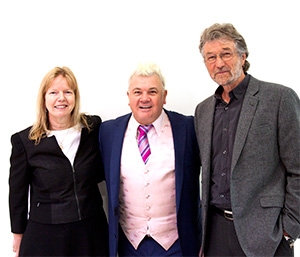Stemming the science 'brain drain'
Research news
The proportion of Australian Year 12 students studying science has plummeted from 94 per cent to about 50 per cent in the past 20 years.
The drop in interest has been attributed to shortcomings in curriculum and teaching and lack of appreciation of career paths - and this is causing concern for Australia’s “knowledge - and technology-driven economy of the future.”
Deakin is a lead university in a $3 million program that aims to entice secondary students back to the science labs. It has just been launched as part of National Science Week by Victoria’s Lead Scientist, Professor Leonie Walsh.
At the launch, Professor Walsh said that the greatest cause of concern was the “significant attrition rates” for secondary and tertiary students taking on science, mathematics and technology subjects. She believes that part of the reason students don’t take on these subjects is because they don’t think they have the ability and they don’t understand the career options, yet three quarters of careers today require skills in these areas.
The program is being conducted in collaboration with Melbourne, Monash and La Trobe Universities, and was featured at BioLAB at Belmont High School, which is a partner in the project and specialises in providing engaging science and maths programs for over 10,000 Victorian school students each year.
Eight Geelong secondary schools will work with Deakin in the implementation phase of the program.
According to Deakin’s Chair in Science Education, Professor Russell Tytler, the new program will take a multi-pronged approach, through initiatives such as pre-service teachers working with researchers in the classroom and developing video and interactive digital activities based on cutting edge science and engineering research.
Scientists from the Institute for Frontier Materials have already begun work on the project, working with pre-service teachers and schools to develop digital resources, including videos, games and other teaching tools, particularly in curriculum areas concerning contemporary materials, renewable energies, sustainability, and mathematical modelling.
The program also includes a "schools visit" program, where Deakin PhD students talk with teachers and students about their research, and a Deakin student-teacher program where education students trial new teaching practices with students.
"The aim is to make science and maths exciting," Professor Tytler said. "Students introduced to science and maths early, in an engaging way, are more likely to continue those subjects through to VCE.
"This will make them far more employable in the future - as well as valuable assets to Geelong and Victoria."
Share this story
 Victoria's Lead Scientist, Professor Leonie Walsh, with Geelong Mayor, Mr Darren Lyons, and Professor Russell Tytler.
Victoria's Lead Scientist, Professor Leonie Walsh, with Geelong Mayor, Mr Darren Lyons, and Professor Russell Tytler.
